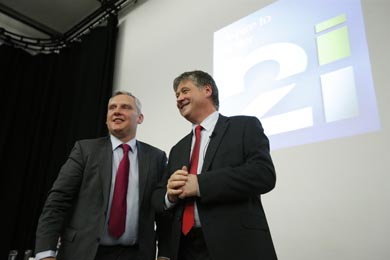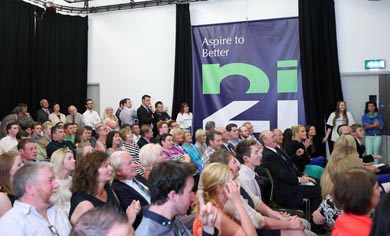THE sixth of June, D-Day, a day etched in the European psyche, was somewhat symbolic for the new political campaign of former UUP MLA’s John McCallister (South Down) and Basil McCrea (Lagan Valley).
They have founded a new political party called NI21 which derives its name from NI for Northern Ireland and the 21 meaning twenty first century freshness and denoting the year ’21’ when the Province of Northern Ireland will celebrate its hundredth anniversary.
[caption id="attachment_39901" align="alignleft" width="390"] MLA’s John McCallister (SouthDown) and Basil McCrea (Lagan Valley) have broken from the more traditional Unionist mould and set up a new pro-unionist middle-of-the-road party open to all to fight local Council, Assembly and Westminster elections.[/caption]
MLA’s John McCallister (SouthDown) and Basil McCrea (Lagan Valley) have broken from the more traditional Unionist mould and set up a new pro-unionist middle-of-the-road party open to all to fight local Council, Assembly and Westminster elections.[/caption]
Speaking just after the launch in Belfast, John McCallister said he was he was delighted at the positive response and added: “There was a real and genuine buzz and the venue was packed to capacity which was very encouraging. There was a real sense that we can change politics here. I know that the hard work begins now and we have a lot to do, but I am confident I can deliver.
“I remain one hundred per cent committed to my constituency of South Down and look forward to the future with enthusiasm.”
The party launch took place in the MAC in Belfast and was well supported by many who are disaffected by the current party political position that dominates the Northern Ireland Assembly and local council chambers.
In his address, John McCallister spelt out clearly why he felt it was necessary to set up a new party, and leave the old politics behind. He said:
“Some of us are here because the political parties we once belonged to have abandoned centre-ground values and reverted to tribalism. Some are here because they know that a political system enshrining Orange versus Green rivalry does not speak to today’s Northern Ireland. We are all here because we aspire for better.
“We aspire for a politics that unites Northern Ireland rather than divides, for a politics that offers meaningful choice rather than merely confirming the status quo. We are here because we want to be part of a new way of doing politics in this society. We want to build politics rather than perpetually dividing our community, and we seek the common good of all.
“Northern Ireland has known great pain through the twentieth century and has experienced much division, fear and lost lives. But our path to maturity as a society has also witnessed important moments which speak of what we can be.
[caption id="attachment_39902" align="alignright" width="390"] John McCallister and Basil McCrea with their NI21 party logo in the background.[/caption]
John McCallister and Basil McCrea with their NI21 party logo in the background.[/caption]
“From the struggle against fascism in the 30’s and 40’s to the creation of the NHS … from proud industrial landmarks and glowing examples of enterprise to our cultural and sporting achievements.
“And then there was the promise of a new beginning with the Agreement.
“Now standing on the cusp of Northern Ireland’s centenary, we know we need to build on what has been achieved and offer a future not defined by past failures and old divisions.
“It is time, in other words, for a politics for a Northern Ireland that has come of age. It is time for NI21.
“I want to point to one way in which we aspire to change politics…to act as a vehicle for reform which will push our political system towards greater accountability to citizens.
“The lack of an Opposition in the Assembly goes to the root of the widespread disillusionment with politics right across our community.
“It also condemns our politics to enduring tribal division rather than fostering a mature political culture in which policy, instead of tribal identity, shapes voters’ choices.
“The idea of Government-without-Opposition would not be accepted anywhere else on these islands in London or Dublin, in Cardiff or Edinburgh.
“A Northern Ireland which aspires to better deserves the accountable government, authentic choice and alternative to sectarian politics which an Opposition brings. For many in the political establishment, Opposition holds little attraction. After all, you don’t get a ministerial car in Opposition.
[caption id="attachment_39903" align="alignleft" width="390"] A section of the audience who attended the launch of NI21.[/caption]
A section of the audience who attended the launch of NI21.[/caption]
“So, NI21 is different. We are inspired by the need to change politics. And we know that this change will come, not through chasing office, but through building an Opposition.
“That is why, on behalf of NI21, before the end of this month, I will launch the required public consultation on my Private Member’s Bill to establish an Opposition.
“Here NI21 is already leading the way, and we challenge the other parties to set aside partisan interest and work with us to change politics in Northern Ireland.
“Changing our politics is not an end in itself. It’s not a political chess game. It is, rather, about changing our society … about offering a real alternative to tribalism and sectarianism.
“If Northern Ireland is to move forward from the politics of tribal divisions, we need a politics that says we are better together.
“This is what today’s United Kingdom stands for …tolerance, inclusion, mutual respect, shared rights and responsibilities. When we in NI21 talk about our place in the United Kingdom, this is what we mean.
“It is a statement of progressive values … not reactionary sentiments.
“It is about building a shared community … not promoting tribal division.
“There is a settled consensus across our community that Northern Ireland is best served through its place in the United Kingdom.
“The challenge is to build a Northern Ireland that more and more reflects the progressive values of today’s United Kingdom.
“While others practise the politics of tribalism while they sustain and encourage Orange versus Green, NI21 robustly and unashamedly says we in Northern Ireland – all of us – are better together.
“Today marks a great start – but it is only a start. We in NI21 know that much work lies in front of us. We will work to earn the trust and support of voters right across this community. If you are frustrated with the state of politics in Northern Ireland, if you share the conviction that tribal politics should not be allowed to shape the future of our children and grandchildren, if you want Northern Ireland to be defined by what we have in common rather than what divides us, together we can change politics in this society.
“Together was can build a future of which we can be proud …a flourishing, open and prosperous Northern Ireland.
“This is the vision of NI21 …join with us in building this future.”
***
Both John McCallister and Basil McCrea were involved in leadership challenges within their former party, the UUP, and ultimately they became disenchanted and frustrated with that brand of unionism. After much discussion and consultation around Northern Ireland, they decided to form NI21 to create a forward movement for an effective opposition in the NI Assembly.
Basil McCrea has rejected the need for labelling political parties as unionist, nationalist or from other positions, saying that what NI21 was about was quite simple… holding the Northern Ireland government to account. Both MLA’s are challenging what they believe is a malaise in the body politic of Northern Ireland that prevents dynamic, effective and democratic processes in government at regional and local level.
The road ahead will all be uphill for the co-founders of NI21 as they face the various pressures from within the unionist camp, from the Alliance Party fearing a challenge of its centre ground hegemony, and from unionist voters who may have voted strategically supporting the SDLP in the past to block Sinn Féin at the polls.
But there will be opportunities too as almost fifty percent of the electorate is not voting, and if NI21 catches a slice of this voter potential and activates a sleeping giant, then politics in the North may indeed change. And if NI21 can mobilise itself quickly enough to make electoral gains and progress into traditional party territory, it may prove it is not just a political flash in the pan.
But that is a lot of ‘ifs’.
NI21 will have to be tested, and time is of the essence as the 2014 RPA shadow elections and EU election approach like a breakless juggernaut. It will be an incredibly busy time for John McCallister and Basil MacCrea in building a new party and breaking the political mould that many now agree is holding Northern Ireland back from unleashing is real potential.
The Good Friday Agreement is just that… an agreement. There seems little mechanism built into it for evaluation which is a key principle of any solid strategic process. Peaceful political growth and change within local institutions may be the only way forward out of the current political arrangement in Northern Ireland. But it will only be won at a price. There will no doubt be politcal winners and losers. Time will tell. History does not stand still.
So what are the key principles of N21:
* it believes in a shared future, leaving behind the sectarian politics of the twentieth century.
* it believes in power-sharing, democratic accountability, and calls for a formal opposition in the Assembly.
* it advocates a society of equals underpinned by full equality and social justice.
* it wants to embrace new economic and social opportunity in many areas and creating a thriving private sector promoting a spirit of entrepreneurialism, and creating a healthy public sector and local government in parallel with a healthy local economy.
* it reaffirms a pro-unionist position by declaring that the interests of all in Northern Ireland are best served within the common good whilst being part of a United Kingdom where social and human rights are protected.
]]>























